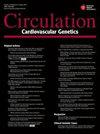New Insights Into the Genetic Basis of Inherited Arrhythmia Syndromes
Q Medicine
引用次数: 41
Abstract
Inherited arrhythmia syndromes encompass several different diseases, including long QT syndrome (LQTS), Brugada syndrome (BrS), catecholaminergic polymorphic ventricular tachycardia (CPVT), short QT syndrome (SQTS), idiopathic ventricular fibrillation (IVF), and progressive cardiac conduction system disease (PCCD).1 The heart is typically structurally normal with no evidence of disease macroscopically. They are an important cause for sudden cardiac death in the young, and an autopsy is typically negative.2,3 Ventricular arrhythmias are caused by mutations of ion channels and their interacting proteins, predominantly involving potassium, sodium, and calcium handling.4 Genetic studies have identified the specific genetic abnormalities that underpin these diseases, even permitting diagnosis in the deceased using postmortem genetic testing (the molecular autopsy).3 Most arrhythmia syndromes are inherited in an autosomal dominant manner, such that first-degree family members have a 50% chance of inheriting the disease. Identification of the mutation allows for predictive genetic testing in other living family members.4 Variable penetrance is common in all arrhythmia syndromes, the same mutation in the same family causing wide variation in phenotype.4 This suggests that other factors such as genetic modifiers and environmental factors may influence the phenotype. This review will highlight the latest developments in understanding the genetic basis of inherited arrhythmia syndromes and discusses the new opportunities and challenges faced with evolving genetic technologies including determining pathogenicity and the utility of large genetic databases. Finally, we will discuss newly described entities that continue the evolving theme of genetic syndromes with phenotypic overlap. Early views that a single genotype associates with a particular phenotype continue to be challenged by our greater understanding of the genotype–phenotype relationship. ### Long QT Syndrome Congenital LQTS is diagnosed in the presence of a prolonged corrected QT (QTc) interval after secondary causes (eg, QT-prolonging medications or electrolyte abnormalities) are excluded.1 The 2013 Heart Rhythm …遗传性心律失常综合征遗传基础的新认识
遗传性心律失常综合征包括几种不同的疾病,包括长QT综合征(LQTS)、Brugada综合征(BrS)、儿茶酚胺能多形性室性心动过速(CPVT)、短QT综合征(SQTS)、特发性心室颤动(IVF)和进行性心传导系统疾病(PCCD)心脏在结构上是典型的正常,在宏观上没有疾病的迹象。它们是导致年轻人心源性猝死的重要原因,尸检结果通常为阴性。室性心律失常是由离子通道及其相互作用蛋白的突变引起的,主要涉及钾、钠和钙的处理基因研究已经确定了导致这些疾病的特定基因异常,甚至允许在死者身上使用死后基因检测(分子解剖)进行诊断大多数心律失常综合征以常染色体显性方式遗传,因此一级家庭成员有50%的机会遗传该疾病。这种突变的识别使得对其他在世的家庭成员进行预测性基因检测成为可能可变外显率在所有心律失常综合征中都很常见,同一家族的相同突变导致表型的广泛差异这表明其他因素,如遗传修饰因子和环境因素可能影响表型。本文将重点介绍在了解遗传性心律失常综合征的遗传基础方面的最新进展,并讨论不断发展的遗传技术所面临的新机遇和挑战,包括确定致病性和大型遗传数据库的应用。最后,我们将讨论新描述的实体,继续进化的主题遗传综合征与表型重叠。早期单一基因型与特定表型相关的观点继续受到我们对基因型-表型关系的更深入理解的挑战。长QT综合征在排除继发性原因(如延长QT间期的药物或电解质异常)后,出现纠正QT间期延长的情况下诊断为非生殖器LQTS2013年心律…
本文章由计算机程序翻译,如有差异,请以英文原文为准。
求助全文
约1分钟内获得全文
求助全文
来源期刊

Circulation-Cardiovascular Genetics
CARDIAC & CARDIOVASCULAR SYSTEMS-GENETICS & HEREDITY
CiteScore
3.95
自引率
0.00%
发文量
0
期刊介绍:
Circulation: Genomic and Precision Medicine considers all types of original research articles, including studies conducted in human subjects, laboratory animals, in vitro, and in silico. Articles may include investigations of: clinical genetics as applied to the diagnosis and management of monogenic or oligogenic cardiovascular disorders; the molecular basis of complex cardiovascular disorders, including genome-wide association studies, exome and genome sequencing-based association studies, coding variant association studies, genetic linkage studies, epigenomics, transcriptomics, proteomics, metabolomics, and metagenomics; integration of electronic health record data or patient-generated data with any of the aforementioned approaches, including phenome-wide association studies, or with environmental or lifestyle factors; pharmacogenomics; regulation of gene expression; gene therapy and therapeutic genomic editing; systems biology approaches to the diagnosis and management of cardiovascular disorders; novel methods to perform any of the aforementioned studies; and novel applications of precision medicine. Above all, we seek studies with relevance to human cardiovascular biology and disease. Manuscripts are examined by the editorial staff and usually evaluated by expert reviewers assigned by the editors. Both clinical and basic articles will also be subject to statistical review, when appropriate. Provisional or final acceptance is based on originality, scientific content, and topical balance of the journal. Decisions are communicated by email, generally within six weeks. The editors will not discuss a decision about a manuscript over the phone. All rebuttals must be submitted in writing to the editorial office.
 求助内容:
求助内容: 应助结果提醒方式:
应助结果提醒方式:


